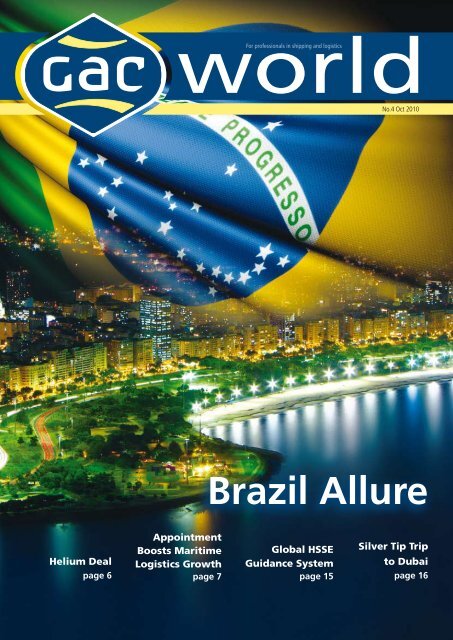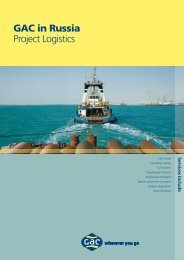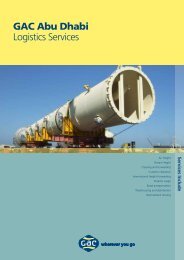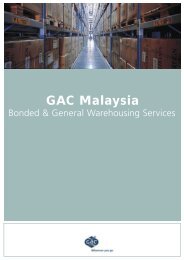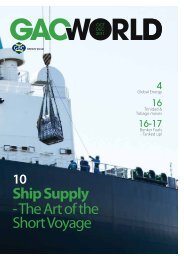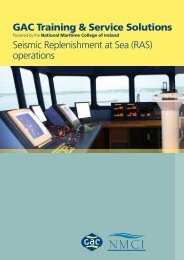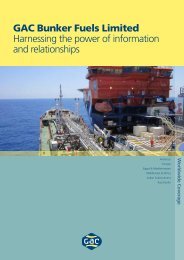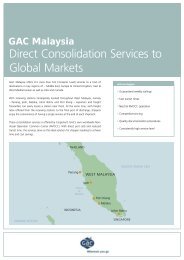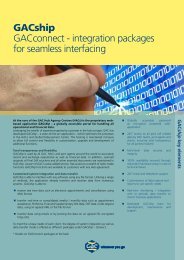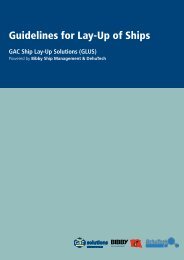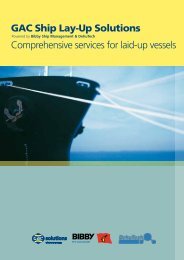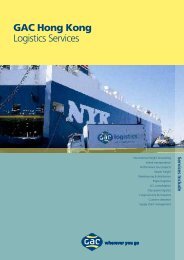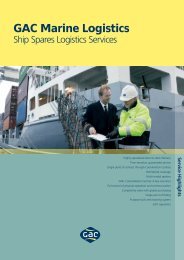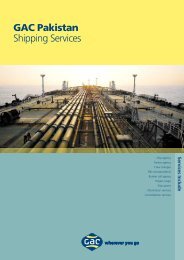GAC World No 4
GAC World No 4
GAC World No 4
Create successful ePaper yourself
Turn your PDF publications into a flip-book with our unique Google optimized e-Paper software.
For professionals in shipping and logistics<br />
world<strong>No</strong>.4 Oct 2010<br />
Brazil Allure<br />
Helium Deal<br />
page 6<br />
Appointment<br />
Boosts Maritime<br />
Logistics Growth<br />
page 7<br />
Global HSSE<br />
Guidance System<br />
page 15<br />
Silver Tip Trip<br />
to Dubai<br />
page 16<br />
OCT 2010 | <strong>GAC</strong> WORLD 1
EDITORIAL<br />
An Exuberant<br />
Spirit...<br />
Brazil is hot in every sense. Its economy is hot, its culture is hot, the politics<br />
are hot, its people are hot and the weather is hot. However, you may be<br />
surprised to learn that snow often falls in the uplands of Rio Grande do Sul,<br />
Brazil’s southernmost state. And that’s the thing about Brazil. Everything<br />
you’ve been told about the country is true. But it is never the full story.<br />
Powerhouses And Paradoxes<br />
There are many poor people in Brazil, true enough. But there is also a huge middle class that is getting<br />
richer by the day. It’s a big place, covering more than 8 million square kilometres. Yet Brasileiros are more<br />
likely to celebrate their hearth and home than carry on about their great wide land. It is a country that<br />
now leads South America in economic strength, infrastructure development and international outreach.<br />
It is also striving to preserve its forests and rivers - and the indigenous people who live there.<br />
Above all, there is a sense of exuberance that has been part of Brazil’s identity for centuries. This,<br />
coupled with the feeling that anything and everything is possible, makes it a place worthy of respect and<br />
investigation. Our brief survey of the country and our work there starts on page 8.<br />
A Real Gem<br />
The appointment of Carlos Arrieta as the<br />
President of <strong>GAC</strong> Energy and Marine<br />
Services (GEMS) in Houston is a sign<br />
of the ambitions we have for this new<br />
operation. Mr Arrieta brings massive<br />
international logistics experience and<br />
intellectual force to our business and he<br />
too knows the importance of Brazil. Read<br />
about it on page 12.<br />
We’ve also strengthened the European<br />
reach of <strong>GAC</strong> Marine Logistics, our<br />
door-to-deck marine spares and supplies<br />
service. Based in the UK, Jamie McPhail<br />
augments dedicated GML sales resources<br />
already at work in the north and south of<br />
the continent.<br />
Elsewhere, new business shoots are<br />
blooming. <strong>GAC</strong> Australia is working<br />
with key suppliers to the huge natural<br />
gas projects unfolding off the north-west<br />
coast. <strong>GAC</strong> Qatar is entering the helium<br />
trade. And <strong>GAC</strong> Sri Lanka is delivering<br />
railway sleepers.<br />
Ever Angola<br />
Our Insight section focuses on the art of<br />
doing business in Africa. We look at what’s<br />
needed through the eyes of <strong>GAC</strong> Angola’s<br />
Managing Director Gerrit Laubscher. Gerrit<br />
speaks with the voice of experience. This is<br />
not theory for him. It’s daily practice.<br />
Safe, Safer, Safest<br />
We all know about the recent oil spill<br />
in the Mexican Gulf. It has injected the<br />
issue of safety, particularly in the energy<br />
sector, firmly into our veins. As a supplier<br />
of services to some of the most high-risk<br />
industries in the world, we recognise<br />
our duty in this area. We must play our<br />
part to foster a healthy, safe, and secure<br />
environment, wherever we go. We report<br />
on our global guideline on page 15.<br />
It’s Finally Over!<br />
After watching my own team, England,<br />
crash and burn and then seeing all those<br />
other glorious struggles for victory and<br />
glory, I can now say that I have had my<br />
<strong>World</strong> Cup. Indeed, ‘the Cup’ is full.<br />
Brazil didn’t win (Forza Espana!), which<br />
is possibly good for the game. But we will<br />
all be focused very sharply on Brazil again<br />
soon enough, when the country stages<br />
the next <strong>World</strong> Cup in 2014 and Rio de<br />
Janeiro hosts the 2016 summer Olympics.<br />
In the meantime, get used to seeing Brazil<br />
on your radar and, equally, in your rear<br />
view mirror.<br />
Neil Godfrey<br />
Editor<br />
neil.godfrey@gac.com<br />
2 <strong>GAC</strong> WORLD | OCT 2010
CONTENTS<br />
Editorial information<br />
LEAD<br />
Editor:<br />
Neil Godfrey,<br />
<strong>GAC</strong> Services Ltd,<br />
London, UK<br />
Art & Production:<br />
BANG Public Relations Singapore<br />
Correspondence to:<br />
Amanda Millen<br />
Email:<br />
gacworld@gac.com<br />
Information quoted in this publication has been<br />
obtained from several sources. Whilst every care<br />
has been taken to ensure that details are correct,<br />
<strong>GAC</strong> cannot provide guarantees thereof.<br />
Material in this publication may be freely quoted,<br />
provided the source is clearly identified. <strong>GAC</strong><br />
<strong>World</strong> is printed on environmentally-friendly<br />
manufactured paper.<br />
Contacting <strong>GAC</strong><br />
Want the contact details for a <strong>GAC</strong> office or staff<br />
member Please visit the Directory section of:<br />
www.gac.com<br />
Back copies of <strong>GAC</strong> <strong>World</strong> are available for<br />
download at www.gacworld.com. Click on ‘News’<br />
and then on ‘<strong>GAC</strong> <strong>World</strong> magazine’.<br />
REGULAR FEATURES<br />
<strong>GAC</strong> WRAP<br />
Brazil Allure 10<br />
It’s no mistake that Brazil has been tagged as a ‘country of the<br />
future’...<br />
Insight: The Joy and Challenge of Africa 4<br />
<strong>GAC</strong> Angola’s General Manager, Gerrit Laubscher, looks at how<br />
businesses can overcome the challenges of working in Africa<br />
to deliver success.<br />
Wherever You Go: <strong>GAC</strong> Kuwait 13<br />
Kuwait was where the <strong>GAC</strong> story started in 1956. More than<br />
five decades later, it is still the country’s leading ship agent<br />
and logistics provider.<br />
Q&A 14<br />
In conversation with <strong>GAC</strong> Thailand’s Shanaka Fernando.<br />
Supporting Big Aussie Project 6<br />
<strong>GAC</strong> Australia is supporting major development works<br />
associated with the Gorgon offshore gas project<br />
Heavy Demands <strong>No</strong> Problem for Rig Moves 7<br />
When Arabian Drilling Services needed two heavy rigs delivered<br />
off Port Sultan Qaboos in Oman, they turned to <strong>GAC</strong>.<br />
Trio Conquers Three Peaks Challenge 15<br />
Marketing men tackle GB’s highest peaks for a good cause.<br />
Silver Tip Trip to Dubai 16<br />
A pair of rare Silver Tip sharks are now swimming around their<br />
new home at the Dubai Aquarium & Underwater Zoo,<br />
courtesy of <strong>GAC</strong>.<br />
OCT 2010 | <strong>GAC</strong> WORLD 3
INSIGHT<br />
Insight:<br />
THE JOY AND CHALLENGE OF<br />
AFRICA<br />
Africa combines obstacles with opportunities, and pitfalls with potential, and it is<br />
not for the faint-hearted. <strong>GAC</strong> Angola’s General Manager, Gerrit Laubscher, looks<br />
at how businesses can overcome the challenges to deliver success.<br />
“Africa is not for the weak.”<br />
There’s an old saying that “Africa is not for the<br />
weak”, and for proof you just have to look at<br />
the transportation you need to tackle its roads.<br />
An ordinary vehicle won’t survive the<br />
trip. You need a quality 4x4 with upgraded<br />
suspension and stocked with water, fuel,<br />
provisions, recovery equipment and a global<br />
positioning system. Experienced African<br />
travelers tell tales of delays at border posts,<br />
painfully slow bureaucracies, and corruption<br />
driven by poverty. It takes an adventurous<br />
spirit to tackle a trip, but travelers will tell of an<br />
unforgettable journey.<br />
It is much the same with doing business<br />
here. It can be tough going, with countless<br />
unforeseeable obstacles standing between you<br />
and Africa’s huge growth potential and wealth<br />
of resources.<br />
Growing demand<br />
Industries like mining, energy exploration<br />
and construction are driving development.<br />
Major consumers like China, the US,<br />
Europe and Brazil are increasingly turning<br />
to Africa to feed their demand for energy<br />
and minerals, and they’re bringing change<br />
with them.<br />
Memory<br />
Angola is an example of how overseas<br />
investment has driven progress. Nearly three<br />
decades of civil war are now a memory, the<br />
government is stable and the economy is<br />
growing. But the infrastructure is still poor,<br />
following years of neglect or destruction.<br />
4 <strong>GAC</strong> WORLD | OCT 2010
INSIGHT<br />
The China effect<br />
Angola cannot rebuild alone and<br />
fortunately, it doesn’t need to. It has<br />
now overtaken the Middle East as the<br />
biggest supplier of crude oil to China,<br />
the market for more than half of the<br />
country’s production. Angolan crude is<br />
being traded for Chinese infrastructure<br />
and construction aid.<br />
It is not unusual to see large Chinese<br />
construction companies flying their flags<br />
here and there are about 9,000 Chinese<br />
workers at sites around the country. ‘New<br />
cities’ such as the Angola Social Housing<br />
Project Kilamba Kiaxi are springing up,<br />
with the help of investors like CITIC,<br />
one of <strong>GAC</strong> Angola’s Chinese customers.<br />
CITIC is developing 20,000 apartments,<br />
shops, schools and municipal facilities.<br />
The logistics challenge<br />
Players in Africa’s freight and logistics<br />
sector have to meet the First <strong>World</strong> demands<br />
of their customers while facing the Third<br />
<strong>World</strong> challenges of poor infrastructure,<br />
long delays, a shortage of local expertise,<br />
low productivity and high costs.<br />
Here, reducing customs clearance<br />
delays from four weeks to three days<br />
may be cause for celebration. But that<br />
is unlikely to impress a customer who is<br />
used to seeing the same task completed<br />
in a day elsewhere. The achievement of<br />
bringing down berthing delays at Luanda<br />
from 2-3 months to 10 days or less is<br />
impressive, but there is still room for<br />
improvement.<br />
Recipe for success<br />
So, what is the recipe for successful<br />
business in Africa<br />
First and foremost, a pioneering spirit<br />
- something there is no shortage of in<br />
the <strong>GAC</strong> Group, given its tradition of<br />
working in difficult environments.<br />
Second, hiring local staff, whose know-how<br />
eases operations and communication, to work<br />
with a small management team of ex-patriates<br />
experienced in international business.<br />
Third, the willingness to invest – in anything<br />
from satellite communications technology to<br />
staff training to raise the levels of employees’<br />
expertise, perhaps via online courses provided<br />
by <strong>GAC</strong>’s Corporate Academy.<br />
Fourth, a strong network to ensure that<br />
coverage can be provided wherever your<br />
clients may need it.<br />
And last but not least, a strong ethics policy<br />
that gives staff the support and confidence<br />
they need to resist pressure to participate<br />
in or turn a blind eye to corruption. Such a<br />
policy, like the one in place throughout the<br />
<strong>GAC</strong> Group, helps build a loyal workforce<br />
and gives clients the peace of mind that<br />
everything will be handled in full compliance<br />
with local and international laws.<br />
Entreprenuer’s paradise<br />
Africa may well be the last surviving paradise<br />
for the adventurous entrepreneur.<br />
All it takes is the right attitude, the<br />
ability to tackle its rugged infrastructure,<br />
adaptability without losing sight of your<br />
destination and local knowledge, to secure<br />
business success.<br />
OCT 2010 | <strong>GAC</strong> WORLD 5
NEW BUSINESS<br />
HELIUM DEAL<br />
<strong>GAC</strong> Qatar has signed a deal with international gas producer Air<br />
Products USA to ship helium from Qatar to the UAE.<br />
Air Products provides the industrial, energy, technology and<br />
healthcare sectors with a portfolio of gases, equipment and<br />
services worldwide.<br />
The helium is transported in ISO tank containers brought in empty<br />
by truck from Jebel Ali to Ras Laffan, where they are filled and<br />
sent on their way by road or sea. As helium gas is highly sensitive,<br />
<strong>GAC</strong> Qatar is also charged with the important task of monitoring<br />
nitrogen levels during transit to ensure it does not evaporate.<br />
“Air Products and <strong>GAC</strong> make<br />
a good match,” says Ravindu<br />
Rodrigo, <strong>GAC</strong> Qatar’s Commercial<br />
Manager. “Both are truly global, put<br />
a premium on quality and invest in<br />
the best people to work for them.<br />
We hope that this contract will be<br />
just the start of a long and mutually<br />
profitable relationship.”<br />
SUPPORTING BIG<br />
AUSSIE PORT PROJECT<br />
<strong>GAC</strong> Australia has been awarded an agency contract by<br />
leading dredging, maritime infrastructure and services expert<br />
Royal Boskalis Westminster N.V. This appointment comes<br />
after <strong>GAC</strong>’s successful handling of the entry and quarantine<br />
procedures for Boskalis for its dredging vessel ‘Cornelis<br />
Zanen’ used for a major project at Fremantle Inner Harbour<br />
and Channel.<br />
Major offshore project<br />
The agreement covers all Boskalis agency requirements in Western<br />
Australia associated with the Gorgon Project at Barrow Island. Boskalis<br />
became involved in the project when Chevron Australia awarded it the<br />
AUD744-million contract to construct terminal facilities to serve the<br />
offshore LNG project.<br />
The initial agency contract covers tug and barging operations carrying<br />
equipment and rock between Henderson in Fremantle and Barrow Island,<br />
as well as agency requirements associated with the operation and import of<br />
craft to Dampier before the vessels head for the environmentally-sensitive<br />
area of Barrow Island.<br />
Relationship<br />
Phil Coolican, <strong>GAC</strong> Australia’s Managing Director, says<br />
the barges, which are around 10,000 dwt, are expected<br />
to generate around 30 port calls and will further cement<br />
<strong>GAC</strong>’s relationship with Boskalis Australia.<br />
He adds: “<strong>GAC</strong> staff in Fremantle and Dampier have<br />
extensive experience in breakbulk and project cargoes, and<br />
they look forward to working with Boskalis and further<br />
developing the relationship between the companies.”<br />
6 <strong>GAC</strong> WORLD | OCT 2010
<strong>GAC</strong> WRAP<br />
APPOINTMENT BOOSTS<br />
MARINE LOGISTICS<br />
GROWTH IN EUROZONE<br />
Heavy<br />
Demands<br />
<strong>No</strong> Problem<br />
For Rig Moves<br />
Marine spares logistics specialist, <strong>GAC</strong><br />
Marine Logistics (GML) has appointed<br />
Jamie McPhail as its Marketing &<br />
Sales Manager to oversee its growing<br />
business in Europe.<br />
Based in the UK, Jamie will promote <strong>GAC</strong>’s<br />
door-to-deck ship spares solutions to ship<br />
owners and management companies in the<br />
region. He will also supervise and liaise with<br />
clients to ensure time sensitive operations<br />
run smoothly.<br />
Hailing from a sea-faring background,<br />
Jamie brings to his new role more than<br />
two decades of management and<br />
operations experience in the maritime<br />
and logistics industry.<br />
The new UK office joins a global<br />
GML network of offices in Singapore,<br />
Hong Kong, India, The Netherlands,<br />
Greece, Germany and Brazil.<br />
When Arabian Drilling Services needed<br />
two rigs weighing more than 7,000 tons<br />
delivered off Port Sultan Qaboos in<br />
Oman, they turned to <strong>GAC</strong>.<br />
Broken down into 37 packages - some<br />
up to 54 tons – the shipment was conveyed<br />
from the works in Houston to Muscat,<br />
where it was cleared through Customs,<br />
and then delivered to the Lekhuware field<br />
about 360 km from the port.<br />
RETRACKED:<br />
45km of rail line between Galle and Matara<br />
in Sri Lanka with <strong>GAC</strong> moving the materials.<br />
In all, <strong>GAC</strong> Sri Lanka shipped 15,000 tons<br />
of rails, sleepers, fittings, bridges and other<br />
essentials to sites along the track. The upgrade<br />
will increase the speed of passenger trains<br />
from 60 mph to a zippy 100 mph.<br />
SEALED:<br />
A new deal between <strong>GAC</strong> Qatar and<br />
EMO-Trans USA to handle 100% of<br />
Maersk Oil Qatar’s freight exports, the<br />
latest development in a relationship which<br />
will lead to further service upgrades to<br />
meet security and supply chain challenges<br />
in the USA.<br />
RE-AWARDED:<br />
For the second time, <strong>GAC</strong> has been named<br />
as ‘Shipping Agent of the Year’ at the Supply<br />
Chain & Transport Awards 2010, the leading<br />
awards event for the Middle East’s transport<br />
and logistics industry. Organised by the ITP<br />
Publishing Group, the annual awards have<br />
become established as a benchmark for<br />
excellence in the industry.<br />
APPOINTED :<br />
Carlos Arrieta as the new President of <strong>GAC</strong><br />
Energy & Marine Services LLC (GEMS),<br />
based in Houston. GEMS, launched in<br />
May, provides integrated logistics services<br />
for the oil, gas, marine and mining sectors.<br />
Mr Arrieta’s immediate priorities are to<br />
implement a strategic marketing plan and<br />
expanding the company’s service portfolio.<br />
After training as a Medical Technologist and<br />
Cancer Researcher,<br />
Mr Arrieta shifted<br />
to logistics and<br />
has spent more<br />
than 30 years<br />
providing global<br />
logistics support<br />
mainly for the oil<br />
and gas sector (see<br />
story page 12).<br />
DEDICATED:<br />
Cricket legend and <strong>GAC</strong> Brand Ambassador<br />
Andrew Flintoff showed what dedication<br />
means to success during a recent luncheon<br />
engagement with <strong>GAC</strong> customers at Dubai’s<br />
Emirates Golf Club. Just as proceedings were<br />
about to start, Flintoff was called away by a<br />
minor family emergency at home (he lives<br />
on the Jumeirah Palm development). He<br />
dashed off to fix the problem and then sped<br />
back to arrive in time for dessert. Legends<br />
know it’s all about timing!<br />
CERTIFIED:<br />
<strong>GAC</strong> Transfer services Dubai, by Det<br />
<strong>No</strong>rske Veritas (DNV), confirming that it<br />
meets with the quality criteria of the ISO<br />
9001:2008, ISO 14001:2004 and ISO<br />
18001:2007 standards.<br />
OCT 2010 | <strong>GAC</strong> WORLD 7
BRAZIL ALLURE<br />
Brazil<br />
Allure<br />
The story of Brazil, as<br />
you will read in the<br />
following pages, is full<br />
of colour, sound and<br />
fury. And we are not<br />
speaking only about<br />
the crowds at Copa do<br />
Brasil matches.<br />
The history of the country has mixed<br />
blood and enlightenment in large<br />
doses. Slaves from Africa, followed<br />
by immigrants from everywhere<br />
else, have made the country’s<br />
culture rich and varied. It has worldclass<br />
industries: it is the world’s<br />
biggest producer of biofuels; its<br />
aircraft industry is a quiet achiever;<br />
its resource industries are well<br />
established. It is also a land of<br />
poverty and rancid exploitation.<br />
But, as you will read, it is a place<br />
of great allure and the 21st century<br />
may well be its greatest.<br />
Brazil's modern capital city, Brasilia<br />
Much More Than Football,<br />
Coffee And Rainforests<br />
It’s no mistake that Brazil has been tagged as a ‘country of the<br />
future’, even as more established economies struggle with the<br />
seismic shifts of the worldwide financial crisis.<br />
In just two decades, the country has gone from virtual bankruptcy<br />
and cancelling foreign debt payments, to offering the International<br />
Monetary Fund (IMF) $10 billion to help developing economies.<br />
Brazil in Brief<br />
Area:<br />
Population:<br />
Capital:<br />
Largest cities:<br />
Main exports:<br />
8.55 million square kilometres<br />
193.7 million (UN, 2009), the world’s 5th<br />
largest population<br />
Brasilia<br />
Sao Paulo & Rio de Janeiro<br />
Manufactured goods, iron ore, coffee,<br />
sugar, oranges, other agricultural produce<br />
GNI per capita: US $7,350 (<strong>World</strong> Bank, 2008)<br />
Natural diversity:<br />
Success story<br />
Today, Brazil is considered one of the four<br />
economies to watch (along with Russia,<br />
India and China) and is widely considered<br />
to be Latin America’s big success story.<br />
It is the region’s most influential country,<br />
an economic giant and one of the world’s<br />
biggest democracies.<br />
According to IMF figures, Brazil’s GDP<br />
/ purchasing power parity has been steadily<br />
rising since 2000 and is set to keep growing<br />
over the next five years.<br />
Many of its politicians and business<br />
leaders believe it is on course to become the<br />
world’s fifth largest economy by 2026.<br />
The Amazon is home to 30% of the world’s<br />
plant and animal life<br />
Like many of its South American<br />
neighbours, however, Brazil’s history<br />
is chequered by political instability,<br />
economic boom and bust, high inflation<br />
and foreign debt.<br />
Natural wealth<br />
One of the keys to Brazil’s current standing<br />
is its rich natural resources, particularly iron<br />
ore, which is in great demand from major<br />
manufacturing nations like China. And thanks<br />
to the development of offshore fields, the<br />
nation has become self-sufficient in oil, ending<br />
decades of dependence on foreign producers.<br />
8 <strong>GAC</strong> WORLD | OCT 2010
BRAZIL ALLURE<br />
TIMELINE<br />
1500 Portuguese land in Brazil and claim it for the Portuguese crown.<br />
1822 Son of Portuguese king declares independence from Portugal and crowns himself Emperor of Brazil.<br />
1888 Slavery abolished. Large influx of European immigrants starts.<br />
1889 Monarchy overthrown and federal republic established with government controlled by coffee<br />
interests. By 1902, Brazil produces 65% of the world’s coffee.<br />
1964 Bloodless coup establishes military rule that brings both repression and rapid economic growth.<br />
1974 Reforms introduced to allow limited political activity and elections.<br />
1982 Brazil halts payment of its main foreign debt, among the world’s biggest.<br />
1989 Economic reforms fail to bring improvements and inflation remains out of control.<br />
Foreign debt payments suspended.<br />
1998 IMF provides rescue package after Brazil’s economy is hit by the collapse of Asian stock markets.<br />
2001 Government plans to spend $40 billion over seven years on roads, railways, hydroelectric projects<br />
and housing in the Amazon basin.<br />
2002 June: Brazil wins football’s <strong>World</strong> Cup for the fifth time.<br />
2002 July: Currency hits an all-time low. Financial markets panic over the prospect of left-winger Luiz<br />
Inacio Lula da Silva winning presidential elections.<br />
2002 October: Luiz Inacio Lula da Silva, popularly known as Lula, wins presidential elections. At his inauguration<br />
in January 2003 he promises political and economic reforms and pledges to eradicate hunger.<br />
2004 Brazil launches its first space rocket.<br />
2006 President Lula is re-elected.<br />
2007 Government officially recognises human rights abuses under the 1964-1985 military dictatorship,<br />
when more than 500 people are believed to have ‘disappeared’.<br />
2008 Brazil turns down an invitation to join Opec.<br />
2009 Brazil says it will offer $10bn to the IMF, to help improve the availability of credit in developing countries.<br />
2010 Brazil gives initial approval for construction of hydroelectric dam in the Amazon rainforest, expected to<br />
be the world’s third largest.<br />
OCT 2010 | <strong>GAC</strong> WORLD 9
BRAZIL ALLURE<br />
A Regional<br />
Perspective<br />
Lars Heisselberg became <strong>GAC</strong>’s Group<br />
Vice President for the Americas in 2009.<br />
His task to develop <strong>GAC</strong>’s business from<br />
Alaska to Patagonia is being made easier by<br />
Brazil’s economic growth.<br />
When <strong>GAC</strong> started its<br />
logistics operation in Brazil it<br />
was primarily with a view to<br />
capture a share of the massive<br />
Asia – Brazil trade, primarily<br />
imports from China, which<br />
by and large is controlled by<br />
Brazilian importers,<br />
he says.<br />
In other words, <strong>GAC</strong> had<br />
to be on the ground in Brazil<br />
to make it happen and<br />
thereby support our Asia<br />
operations. This is what we<br />
refer to as G2G (<strong>GAC</strong> to<br />
<strong>GAC</strong>) business.<br />
Sailing Down To Rio<br />
<strong>GAC</strong> begins ship agency operations in Brazil<br />
The rise and rise of Brazil in the<br />
shipping and energy sectors has<br />
prompted <strong>GAC</strong> to establish its<br />
latest ship agency operation there,<br />
with a coordination centre in Rio<br />
de Janeiro.<br />
<strong>GAC</strong> Brazil will work with its own<br />
team and its established network of<br />
sub-agents to offer a full range of<br />
support services for vessels, crew<br />
and cargo, both in-port and offshore<br />
all major Brazilian ports.<br />
Meeting demand<br />
“Continuing growth in Brazil’s economy and<br />
industrial output has boosted demand for<br />
first class ship agency and related services,”<br />
says Lars Heisselberg, <strong>GAC</strong> Group Vice<br />
President – Americas. “We decided it was<br />
time to position the expertise, experience<br />
and resources to meet that demand.”<br />
Christ the Redeemer, Rio de Janeiro, Brazil<br />
Integrated service options<br />
The new ship agency operation complements<br />
existing logistics services provided by <strong>GAC</strong><br />
in Brazil.<br />
“We operate in a world where clients<br />
want more integrated service packages and<br />
the savings that arise from them,” says <strong>GAC</strong><br />
Brazil MD, Rodrigo De Marco. “We aim to<br />
provide differentiated shipping and logistics<br />
services to our clients and give them a wider<br />
range of service options.”<br />
Boundless potential<br />
<strong>GAC</strong> has appointed Capt. Robert Olsson<br />
as its General Manager, Shipping Services,<br />
in Brazil.<br />
“Growth potential in Brazil is boundless,”<br />
he says. “In the long term I expect <strong>GAC</strong> to<br />
become a strong player in this market. The<br />
<strong>GAC</strong> team has the network, knowledge<br />
and contacts to be the first choice for ship<br />
owners and charterers active here.”<br />
Natural step<br />
Heisselberg adds: “Our recent launch of ship<br />
agency services throughout Brazil is a natural<br />
step offering our customers integrated<br />
services like we do in most other locations<br />
around the world. Brazil’s economic growth<br />
and business potential cannot be ignored,<br />
particularly in the energy sector, and we<br />
expect the establishment of <strong>GAC</strong> Energy<br />
& Marine Services in Houston to play an<br />
important role together with <strong>GAC</strong> Brazil in<br />
securing a share of upcoming projects.”<br />
10 <strong>GAC</strong> WORLD | OCT 2010
BRAZIL ALLURE<br />
The View From Sao Paulo<br />
Looking out on the bustling streets of Sao<br />
Paulo, Brazil’s largest city, Rodrigo De Marco<br />
is cautiously optimistic.<br />
As Managing Director of <strong>GAC</strong> Brazil,<br />
he has seen the country emerge from the<br />
economic woes of the 1980s and 90s and<br />
business is now doing well. While many<br />
advanced economies continue their slow and<br />
difficult recovery from the world financial<br />
crisis, growth is the key word in Brazil.<br />
Stabilisation<br />
“The past decade has been characterised by<br />
the stabilisation of the Brazilian economy,<br />
which has brought a significant increase in<br />
foreign direct investment,” says De Marco.<br />
“Brazil’s economy has resisted the<br />
downturns in international financial markets<br />
largely because growth has been built<br />
on a fast-growing domestic market and a<br />
diversified trading sector. We’re expecting<br />
to see growth of 7% in 2010.”<br />
Target<br />
The <strong>GAC</strong> Group identified Brazil as one of<br />
its target areas for business development<br />
in the early 2000s. As such, it was one<br />
of many international companies to<br />
back up their belief in the country with<br />
significant direct investment. <strong>GAC</strong> Brazil<br />
now runs successful logistics, ship agency<br />
and marine operations and its customer<br />
base includes international clients in the<br />
consumer goods, marine, pharmaceutical,<br />
automobile, electronic, petro-chemical<br />
and oil and gas industries.<br />
Exports - both of commodities and an<br />
increasing number of manufactured and<br />
semi-manufactured goods - and imports<br />
of equipment and other capital goods<br />
form a complex web of production<br />
and consumption.<br />
Potential<br />
De Marco says key areas for growth include<br />
civil construction and infrastructure projects,<br />
driven by Government initiatives and further<br />
boosted by upcoming world-class sport events<br />
the country will host.<br />
Like many of his countrymen in a footballmad<br />
nation, he is looking forward to the next<br />
<strong>World</strong> Cup in 2014 – as much for the business<br />
it will bring as for the soccer spectacle it<br />
promises.Other areas with great potential<br />
include shipbuilding and the energy sector,<br />
particularly offshore.<br />
“ These are opportunities<br />
that have never been seen<br />
here before, ”<br />
says De Marco.<br />
“However it is really important that tax<br />
reforms to encourage private enterprise are<br />
enacted to guarantee that momentum is<br />
maintained and steady growth is made in the<br />
years to come. Another challenge for Brazil is<br />
to upgrade its infrastructure – especially its<br />
airports and ports. These are keys to delivering<br />
on the promise of all the new development. ”<br />
OCT 2010 | <strong>GAC</strong> WORLD 11
BRAZIL ALLURE<br />
A ‘Gem’ Of An Opportunity<br />
Brazil features firmly in the plans of <strong>GAC</strong><br />
Energy & Marine Services (GEMS), which<br />
started in Houston in May this year.<br />
GEMS President, Carlos Arrieta, says<br />
once the new operation has consolidated<br />
its position in the US market, attention<br />
will shift south. He knows the potential of<br />
the Brazilian energy sector.<br />
“Brazil is the region’s largest market<br />
when it comes to oil and gas,” he says.<br />
“It’s a growing market, comparable to the<br />
Middle East and Russia.”<br />
Collaboration<br />
GEMS will work closely with <strong>GAC</strong> Brazil’s<br />
logistics team to develop operations from<br />
bases in Rio de Janeiro and Sao Paulo.<br />
“We plan to work<br />
collaboratively in Brazil<br />
to make the most of<br />
our colleagues’ proven<br />
local reputation, know-how<br />
and experience,”<br />
says Arrieta.<br />
Ideally placed<br />
Based in the new Central Green development<br />
close to Houston International Airport,<br />
GEMS is ideally placed to serve energy<br />
companies throughout the Americas. It has<br />
65,000 square feet of covered warehousing<br />
space and 40,000 square feet of open air<br />
storage to support services that include: inhouse<br />
case packing; international or domestic<br />
air and ocean freight management; and<br />
charter and project services.<br />
Brazil’s Powerhouse Inland Port<br />
It is 1,450 km from the coast, in the heart of the Amazon rainforest, and it’s<br />
one of Brazil’s key ports.<br />
Manaus was also the first city in the country to have electricity, and its grand<br />
architecture, ornate opera house, universities and cosmopolitan lifestyle stand<br />
in marked contrast to the dense jungle that surrounds it.<br />
Rubber Roots!<br />
A small fort was first established at the<br />
confluence of two great rivers, the Amazon<br />
and Negro, in 1669, but it was the natural<br />
rubber industry that brought prosperity to the<br />
region and its river port from the late 1800s.<br />
Port facilities were upgraded in the early<br />
1900s with many of the buildings of this<br />
period ordered from Europe, giving the city<br />
its unique character.<br />
When the rubber trade collapsed in the<br />
1920s, Manaus went into decline and did not<br />
recover until 1967 when it was made a dutyfree<br />
zone.<br />
Transport hub<br />
Today, Manaus is Brazil’s eighth largest city<br />
with more than 1.7 million people. The port<br />
is an important destination for ocean-going<br />
vessels and is the main transport hub for the<br />
entire Amazon Basin.<br />
It imports beef from the hinterlands,<br />
exports hides and leather, and manufactured<br />
goods such as soap, chemicals, electronics<br />
equipment and mobile phones. Other<br />
industries include shipbuilding, brewing, and<br />
refining of petroleum shipped in by barge.<br />
The recent discovery of petroleum in the<br />
area could signal another wave of prosperity.<br />
Eco-business<br />
More and more tourists are hitting the eco-trail<br />
and heading for Manaus, bringing with them a<br />
new source of income.<br />
They flock to see the wealth of wildlife<br />
around (and within) the city, and tour boats<br />
take visitors to see where the black waters of<br />
the Rio Negro meet brown of the Solimões<br />
River where they flow together for 9 km<br />
without mixing.<br />
12 <strong>GAC</strong> WORLD | OCT 2010
WHEREVER YOU GO<br />
<strong>GAC</strong> Kuwait<br />
In <strong>GAC</strong>’s office in Shuwaikh you can see on the wall ‘Kuwait Shipping Licence <strong>No</strong>.1’,<br />
marking <strong>GAC</strong> as the first agency to be registered in the country back in 1956.<br />
More than five decades later, <strong>GAC</strong> remains Kuwait’s leading ship agent and<br />
logistics provider and is investing continually to meet demand both in the country<br />
and in neighbouring Iraq.<br />
Investment<br />
Managing Director Ronald Lichtenecker<br />
says: “Kuwait is where the <strong>GAC</strong> story<br />
started in the mid-1950s and over more<br />
than five decades, we have built up a<br />
comprehensive suite of services. This goes<br />
hand-in-hand with our policy of investment<br />
in infrastructure and other resources, which<br />
distinguishes us from the competition and<br />
ensures our continuing success.”<br />
<strong>GAC</strong> Kuwait also coordinates all <strong>GAC</strong><br />
operations in Iraq, including the handling<br />
of specialised oil field equipment for the<br />
local energy sector, as well as grain imports<br />
and occasional aid shipments.<br />
Managing Director, Ronald Lichtenecker<br />
OCT 2010 | <strong>GAC</strong> WORLD 13
<strong>GAC</strong> FACES<br />
Q & A:<br />
Shanaka Fernando<br />
Born:<br />
1975, in Colombo, Sri Lanka.<br />
Before <strong>GAC</strong>:<br />
Worked as a Trainee Operations<br />
Executive for McLarens Shipping (<strong>GAC</strong><br />
Sri Lanka’s local partner) from 1993 –<br />
1994.<br />
Joined <strong>GAC</strong>:<br />
Joined <strong>GAC</strong> Sri Lanka in 1994 as<br />
Operations Executive, and was promoted<br />
to Assistant Operations Manager in 2000.<br />
Appointed in 2001 as Warehouse and<br />
Distribution Manager for the <strong>GAC</strong> Sri<br />
Lanka-managed Unilever Distribution<br />
Centre, and was promoted in 2002 to<br />
Shipping Manager – <strong>GAC</strong> SL. Transferred<br />
in 2003 to <strong>GAC</strong> Qatar as the Business<br />
Manager – Shipping Services, before<br />
being relocated again to <strong>GAC</strong> Thailand.<br />
What motivates you<br />
The uniqueness of the shipping industry, not<br />
knowing what lies ahead. In shipping, every day<br />
brings new challenges.<br />
You came to Thailand from the Middle<br />
East. What was the biggest difference<br />
to strike you when you first arrived<br />
First it was the greenery of naturally grown trees all<br />
around you. Then there was the culture shock, which<br />
took me several months to come to grips with. In<br />
the Middle East, 99% of the people I was dealing<br />
with were ex-pats. In Thailand, it is the complete<br />
opposite. Then you have the language barrier - most<br />
people will communicate with you only in Thai, so it<br />
helps to learn basic Thai as quickly as you can.<br />
What impact has the recent political<br />
instability in Thailand had on business<br />
In my opinion, this has had little impact on the<br />
shipping industry of Thailand. We have not seen<br />
any decline in the numbers of vessels calling here.<br />
However, my colleagues tell me it has had a greater<br />
impact on logistics, and of course, the country’s<br />
tourism industry has suffered.<br />
How did the troubles affected you<br />
and other staff members<br />
Initially, it was just a normal protest. Then,<br />
we saw the protestors building camp sites<br />
around the office, which was not normal but<br />
seemed nothing to be alarmed about. However,<br />
towards the end when things got violent, we<br />
had to close the main office for almost a week.<br />
It was disturbing to see burning tyres on the<br />
street and hear shots being fired. We were<br />
lucky none of us was affected - we bounced<br />
back quickly.<br />
In more stable times, what are the<br />
secrets to business success in Thailand<br />
Think local in your relationships with customers,<br />
suppliers, vendors and authorities. It is a very<br />
important part of the Thai business culture.<br />
Do you believe that conflict is always<br />
a bad thing, or can it produce positive<br />
side-effects<br />
We saw many positive side effects coming from<br />
the conflict here. On the one hand, we understood<br />
how vulnerable we could be in a conflict situation.<br />
But we also learnt that with today’s technology<br />
and <strong>GAC</strong> applications you can sit anywhere and<br />
do business. The shared experience also brought<br />
colleagues closer together.<br />
What do you consider to be the most<br />
useful thing you were ever taught by<br />
someone else<br />
“In matters of style, swim with the current. In<br />
matters of principle, stand like a rock!”<br />
What do you consider to be the most<br />
useful thing you learned by yourself<br />
Be fair to people around you. Try to assess the<br />
situation in the other person’s shoes.<br />
Name three things that are essential<br />
to you for your work.<br />
My notebook, my staff and - most importantly - the<br />
support of my wife.<br />
How much of a team player are you<br />
I like to think that I am very much a team player.<br />
Just as in football, you cannot score alone!<br />
14 <strong>GAC</strong> WORLD | OCT 2010
Trio Conquers<br />
Three Peaks Challenge<br />
<strong>GAC</strong> WRAP<br />
They may be Marketing Men, but <strong>GAC</strong>’s<br />
Peter Österman, Sami Younis and Simon<br />
Heywood recently did some serious<br />
number-crunching for a good cause:<br />
24<br />
Length in hours of The Sailors’ Society<br />
Three Peaks Challenge 2010<br />
3<br />
Number of mountains climbed (Ben<br />
Nevis in Scotland, Helvellyn in England &<br />
Snowdon in Wales)<br />
11,084<br />
Altitude in feet ascended by the climbers<br />
(4,406, 3,118 & 3,560 respectively)<br />
28<br />
Number of miles walked<br />
500<br />
Distance in miles travelled by road<br />
5,485<br />
Total in British Pounds raised for The<br />
Sailors Society (to date).<br />
The <strong>GAC</strong> trio joined 49 other teams for the<br />
annual charity challenge to scale the UK’s<br />
three highest mountains, but they were<br />
one of a few that had not done any ‘team<br />
training’ in preparation due to their diverse<br />
geographical locations.<br />
Of course, as marketing men, they know<br />
about uphill struggles and are accustomed to<br />
having competition close on their heels…<br />
Every muscle<br />
Simon says: “As the challenge fell beneath our<br />
marching feet, we came to know each muscle<br />
in our legs, each toe butting the front of our<br />
boots and how much our rasping lungs had to<br />
inflate to fill every crack between our ribs.”<br />
They conquered Ben Nevis in 4 hours 40<br />
minutes, Helvellyn in 2 hours 15 minutes<br />
(coming 12th in a night ascent), and Snowdon<br />
in 3 hours 50 minutes. Their reward was a<br />
slap-up supper and refreshments at Liverpool’s<br />
Maritime Museum, followed by a good night’s<br />
sleep before they returned to their homes in<br />
London, Stockholm and Sintra (Lisbon).<br />
HSSE CORNER:<br />
<strong>GAC</strong>’s Global<br />
Guidance<br />
System<br />
Moves &<br />
Appointments<br />
PT Andhika <strong>GAC</strong>, Indonesia<br />
Teddy Devrizal<br />
Shipping Manager<br />
Previously:<br />
Trade Product Manager for P&O<br />
Nedlloyd.<br />
<strong>GAC</strong> Marine Logistics, Edinburgh, UK<br />
Jamie McPhail<br />
Sales and Marketing Manager<br />
Previously:<br />
More than two decades<br />
experience both sea-going and<br />
on-shore in the maritime and<br />
logistics industry.<br />
<strong>GAC</strong> Nigeria<br />
Gerrit Van Der Merwe<br />
General Manager, Finance<br />
Previously:<br />
with Metcash Africa (Pty) Ltd.,<br />
Thebe Medical (Pty) Ltd. And<br />
Haumann Rodger Chartered<br />
Accountants.<br />
<strong>GAC</strong> USA, Houston<br />
Carlos Arrieta<br />
President of <strong>GAC</strong> Energy and<br />
Marine Services<br />
Previously:<br />
Worked extensively in the<br />
transportation and logistics<br />
industries worldwide.<br />
Recognising the importance of effective<br />
Health, Safety, Security & Environmental<br />
practices in the industries it serves, <strong>GAC</strong><br />
has released a Group-wide Guidance<br />
System that sets minimum global standards<br />
for all <strong>GAC</strong> staff and contractors.<br />
Marine & Safety Manager Capt. Björn<br />
Brödje says the Global HSSE Guidance<br />
System gives simple, flexible and<br />
understandable procedures for providing<br />
safe, healthy and secure working conditions<br />
with minimal environmental impact.<br />
Says Capt. Björn: “Every procedure –<br />
from vehicle / launch safety or the use<br />
of personal protective equipment, to the<br />
handling of hazardous substances and<br />
structured HSSE reporting – puts people<br />
at its heart. After all, it’s people that make<br />
procedures work.”<br />
OCT 2010 | <strong>GAC</strong> WORLD 15
<strong>GAC</strong> WRAP<br />
Silver Tip Trip<br />
TO DUBAI<br />
There’s a pair of rare Silver Tip sharks<br />
swimming around the Dubai Aquarium &<br />
Underwater Zoo at The Dubai Mall, courtesy<br />
of <strong>GAC</strong>. As Mario Coelho, <strong>GAC</strong> Dubai’s<br />
Airfreight Manager, explains, it was a sensitive<br />
and challenging task – witnessed by the fact<br />
that the operation was filmed by a National<br />
Geographic crew for a documentary series on<br />
the transportation of wild animals.<br />
Long haul<br />
“The sharks were coming in by air from<br />
Cairns in Australia – via Hong Kong – and it<br />
was probably the first time that this particular<br />
species had been on such a long journey. And<br />
naturally, there were special considerations<br />
to ensure their welfare throughout the trip,”<br />
says Mario.<br />
<strong>GAC</strong> has been handling live shipments for<br />
Dubai Aquarium & Underwater Zoo since<br />
2007, including several high profile imports.<br />
Most recently it brought Gentoo Penguins<br />
from Scotland. The key requirement in all<br />
cases is to eliminate any delays and minimise<br />
the amount of time the animals are in transit.<br />
Ready for anything<br />
But even the best-laid plans can be disrupted.<br />
That’s what happened when the shipment<br />
was held up due to a tropical storm warning<br />
in Hong Kong.<br />
“Fortunately, <strong>GAC</strong> has an ‘emergency<br />
preparedness’ mindset – ready to deal<br />
with any contingency at any stage of the<br />
job,” says Mario. “We only had one day to<br />
re-arrange everything, brief all parties and<br />
obtain new passes from Dubai’s Customs<br />
Authority and police. Here, our excellent<br />
relations with the local authorities helped<br />
put everything in place for the new date.<br />
On top of everything else, we also had to<br />
arrange to get the National Geographic<br />
crew airside and make sure they had<br />
permits to film the flight’s arrival.”<br />
“Meanwhile, we had arranged for the<br />
special container holding the two sharks to<br />
be offloaded and transferred to special ‘cool<br />
dollies’ to protect them from the searing<br />
Dubai heat. They were then transferred to a<br />
special <strong>GAC</strong> Reefer truck set at 20 degrees<br />
Celsius for the trip. Once they arrived at<br />
Dubai Aquarium & Underwater Zoo, the<br />
sharks were handed over to the experts for<br />
offloading and acclimatisation.<br />
“A key role in the success of this operation<br />
was played by the local authorities who<br />
expedited all approvals and permits, and in<br />
particular the DCA/Dubai Airport teams,<br />
DNATA, security and the Ministry.”<br />
Smooth<br />
Says Paul Hamilton, Curator of Dubai<br />
Aquarium & Underwater Zoo: “Though it<br />
was the first time this particular species had<br />
undergone a long haul journey, thanks to<br />
the seamless work by <strong>GAC</strong> this was one of<br />
the smoothest shark transports that I have<br />
ever been part of. They arrived healthy,<br />
with minimum stress and started feeding<br />
within 40 minutes of being put into their<br />
new environment.”<br />
16 <strong>GAC</strong> WORLD | OCT 2010<br />
www.gac.com


